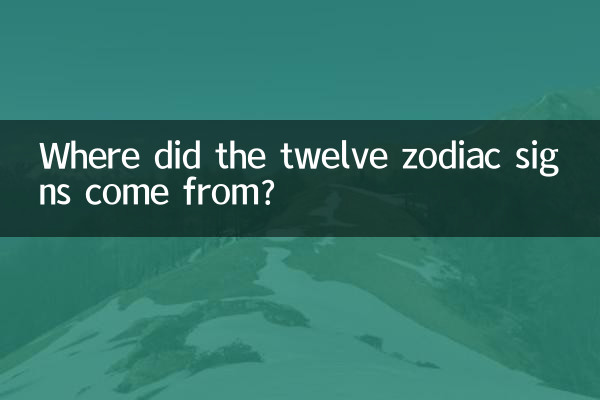Where did the twelve zodiac signs come from?
In today's era of information explosion, constellation culture still occupies a place as a hot topic. Whether it’s horoscope analysis on social media or zodiac personality discussions among friends, the zodiac signs always seem to spark interest. So, where did the twelve constellations come from? What unknown stories are hidden about their origins? This article will take you to deeply explore the historical origins and cultural background of the twelve constellations.
1. The Origin of the Twelve Constellations

The origins of the zodiac can be traced back to the ancient Babylonian civilization. Around 3000 BC, in order to facilitate observing astronomical phenomena and recording time, the Babylonians divided the ecliptic (the path of the sun in the sky) into 12 equal parts, each equal part corresponding to a constellation. This method of division was later inherited and developed by the Greeks, eventually forming the twelve constellation system we know today.
| Constellation name | Corresponding date | Symbolic meaning |
|---|---|---|
| Aries | March 21st - April 19th | Brave, impulsive |
| Taurus | April 20-May 20 | Steady and stubborn |
| Gemini | May 21st - June 21st | Flexible and changeable |
| Cancer | June 22-July 22 | Emotional and sensitive |
| leo | July 23-August 22 | confidence, leadership |
| Virgo | August 23-September 22 | Meticulous and perfectionistic |
| Libra | September 23rd - October 23rd | fair and balanced |
| Scorpio | October 24th - November 22nd | mysterious, profound |
| Sagittarius | November 23rd - December 21st | freedom, optimism |
| Capricorn | December 22nd - January 19th | Pragmatic and tenacious |
| aquarius | January 20th - February 18th | innovative, independent |
| Pisces | February 19th - March 20th | romantic, sensual |
2. Twelve Constellations and Greek Mythology
Greek mythology gives the twelve constellations a rich story background. For example, Aries symbolizes the story of the Golden Fleece, Cancer is associated with the battles of Heracles, and Scorpio represents Orion's old enemy. These myths and stories not only add to the mystery of the constellations, but also make the constellation culture more popular among people.
3. The popularity of modern constellation culture
In modern society, constellation culture has become a global phenomenon. Whether it is horoscopes, zodiac matching, or zodiac personality analysis, they have attracted the attention of a large number of young people. On social media, zodiac topics often become popular tags, and many celebrities and Internet celebrities are also willing to share their own zodiac characteristics, further promoting the spread of zodiac culture.
4. Scientific controversy over constellations
Despite the popularity of horoscope culture, its scientific validity has been controversial. Astronomers note that the positions of the zodiac signs have shifted from their actual constellations due to a shift in the Earth's axis of rotation, known as "precession." In addition, psychological research shows that zodiac personality analysis may be more of a "Barnum effect", that is, people tend to accept vague and general descriptions.
5. The future of constellation culture
In any case, horoscope culture has become a part of modern life. It not only provides people with a way of entertainment, but also becomes a topic in interpersonal communication. In the future, with the development of science and technology and the integration of cultures, constellation culture may exist in more diverse forms and continue to accompany humans in exploring the mysteries of themselves and the universe.
Through the above content, we not only understand the historical origins of the twelve constellations, but also explore the reasons for their popularity and controversy in modern society. As an ancient and modern phenomenon, constellation culture deserves our in-depth thinking and appreciation.

check the details

check the details